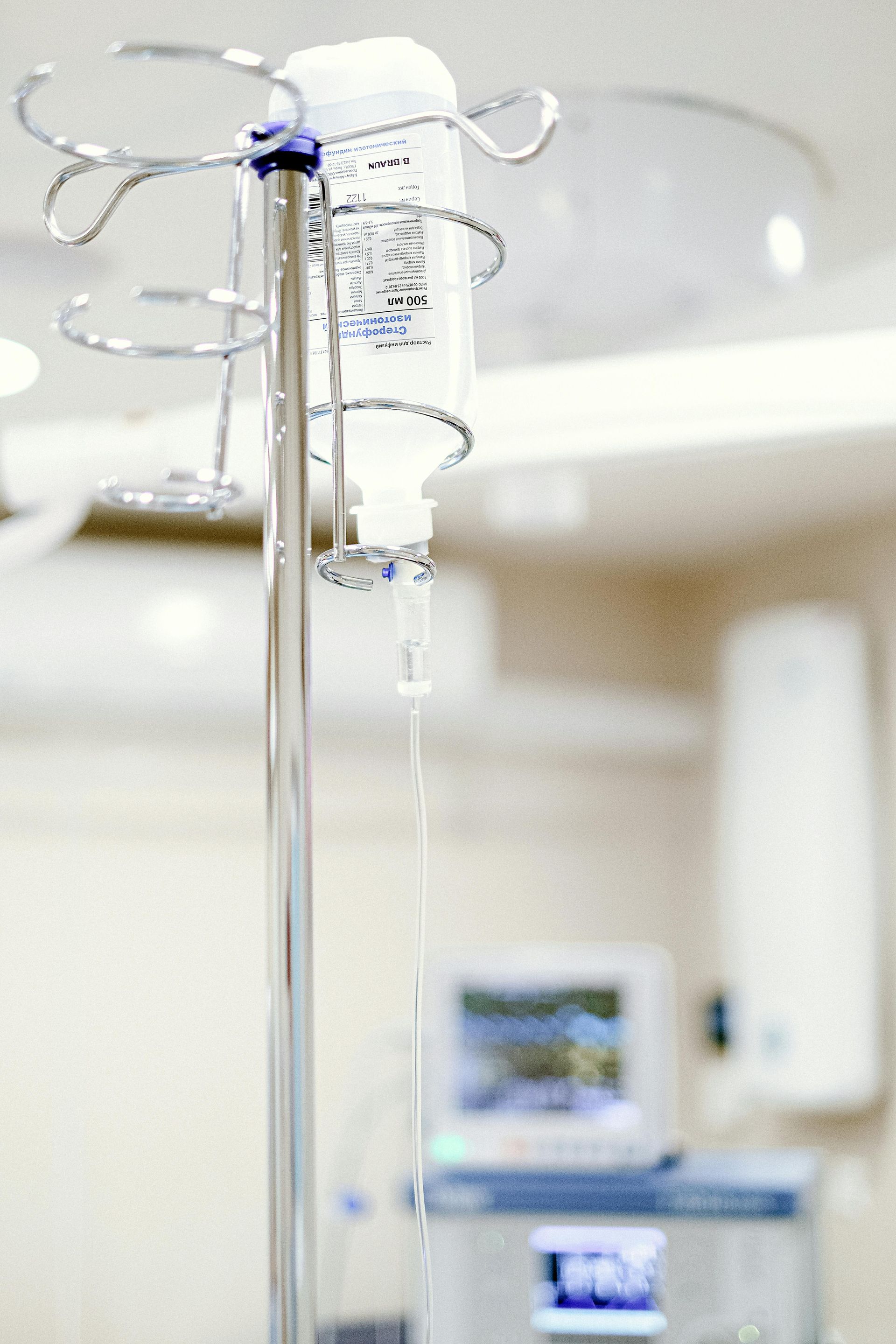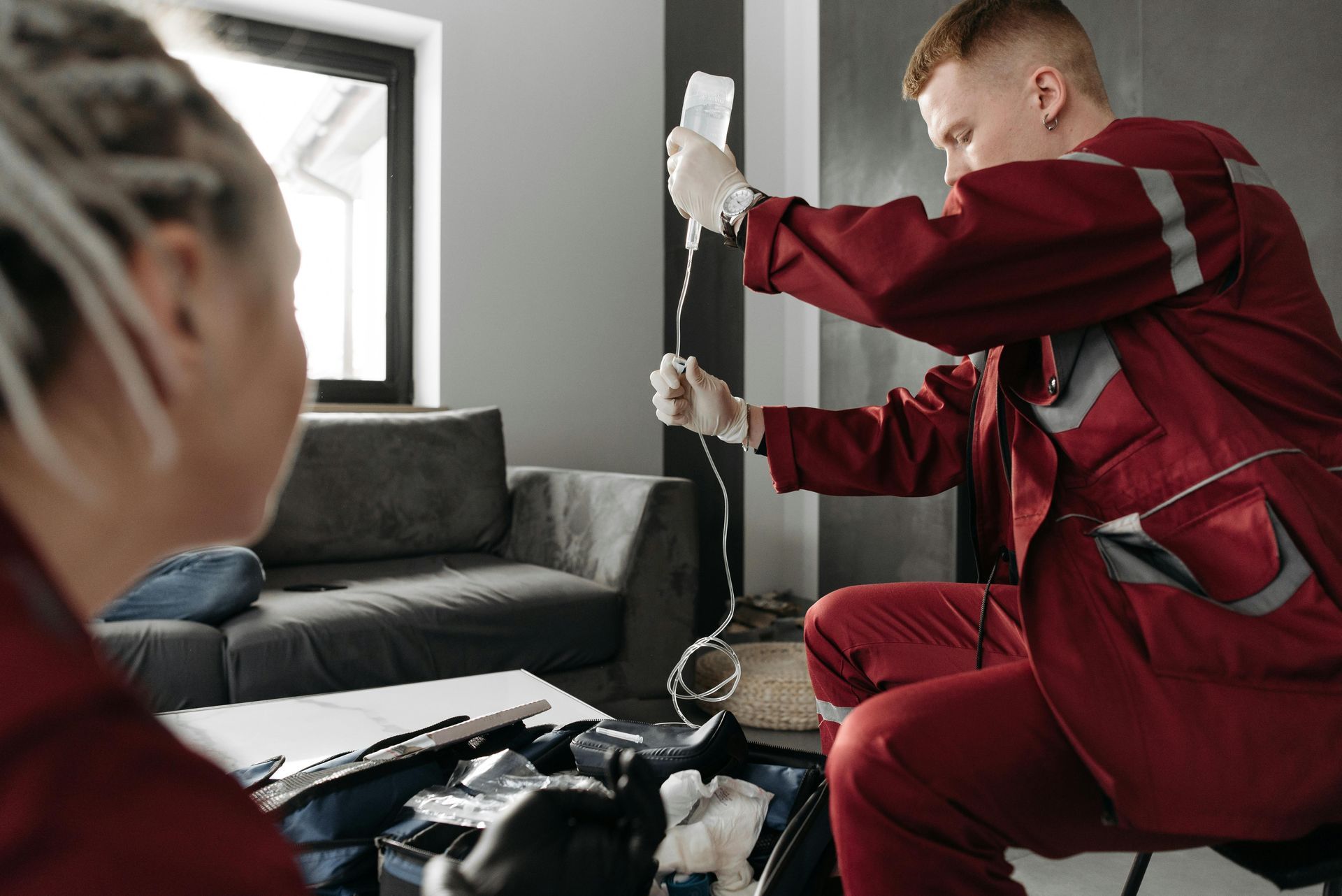Dehydration IV Therapy for Rapid Hydration and Peak Performance

Medically reviewed by Micaela Strevay, FNP-C, PMHNP-BC
Table of Contents

Water is essential to our survival, and staying hydrated is crucial for maintaining our overall health and wellbeing. However, sometimes drinking water is not enough, especially when dehydration sets in.
Dehydration can occur for various reasons such as intense physical activity, illness, or even drinking alcohol. When dehydration occurs, our bodies crave quick and effective rehydration. This is where IV therapy comes in. Intravenous (IV) therapy for hydration is a fast and effective way to rehydrate the body.
The IV treatment involves administering a mixture of fluids and electrolytes directly into the bloodstream, bypassing the digestive system for immediate absorption. In this article, we will explore the science behind IV therapy for dehydration and how it can help maximize hydration for optimal health and wellness.

Understanding Dehydration and its Effects on the Body
Dehydration occurs when the body loses more fluids than it takes in. The human body consists of around 60% water, which plays an essential role in many bodily functions, including regulating body temperature, transporting nutrients to cells, and removing waste.
When the body is deprived of water, it can cause an imbalance in these functions, leading to a variety of dehydration symptoms, including:
- Thirst
- Dry mouth and throat
- Fatigue
- Dizziness
- Headache
- Muscle cramps
- Dark urine or decreased urine output
In severe cases, dehydration can lead to life-threatening conditions such as heatstroke or kidney failure. It is crucial to recognize the signs of dehydration and take action to prevent and treat it.
How IV Therapy Works to Maximize Hydration
IV therapy for dehydration involves the administration of fluids and electrolytes directly into the bloodstream through a vein. The solution used in IV therapy contains a balanced mixture of water, sodium, potassium, and other essential nutrients, which are rapidly absorbed by the body.
The infusion bypasses the digestive system, allowing the body to absorb the fluids and electrolytes faster than drinking water or other oral rehydration methods.
The IV infusion is typically administered through a small catheter inserted into a vein in the arm or hand. The catheter is connected to a bag of fluid, which is elevated to create a gravity flow. The amount and rate of the infusion depend on the severity of dehydration and the patient's weight and medical condition.
Keeping your body hydrated should always be a priority. IV therapy for dehydration is an effective and efficient way to restore the body's hydration levels quickly.

The Science Behind IV Therapy - Osmosis and Diffusion
IV rehydration therapy works by utilizing the natural processes of osmosis and diffusion. The science behind IV therapy lies in the principles of osmosis and diffusion.
Osmosis is the process by which water molecules move from an area of low solute concentration to an area of high solute concentration through a semi-permeable membrane. Diffusion is the movement of solutes from an area of high concentration to an area of low concentration.
In the case of IV therapy, the solution infused into the bloodstream contains a higher concentration of solutes than the body's cells. This creates an osmotic gradient, causing water to move from the cells into the bloodstream, where it is needed.
The electrolytes in the solution help restore the balance of sodium, potassium, and other essential minerals in the body, promoting proper cellular function. Mild dehydration can be reversed in as little as 30 minutes, while more severe cases may take up to four hours.

Benefits of IV Therapy for Dehydration
Compared to sports drinks and oral rehydration solution, IV therapy for hydration is more effective and efficient in restoring fluid balance in the body.
Taking IV therapy to treat dehydration provides numerous benefits, including:
Rapid Rehydration
IV therapy delivers fluids and electrolytes directly into the bloodstream, bypassing the digestive system for immediate absorption. IV hydration therapy is often recommended for people who are unable to drink fluids due to vomiting, diarrhea, or other medical conditions.
Customizable Treatment
IV therapy can be customized to meet the patient's specific needs, including the volume and composition of the solution and the rate of infusion. An IV drip can also be tailored to provide additional nutrients, such as vitamins and minerals.
Improved Nutrient Absorption
IV therapy can improve the absorption of nutrients, especially in patients with digestive disorders or malabsorption issues.
IV fluids include saline solution, glucose, vitamins, minerals, and other beneficial compounds that can help improve overall health.
Reduced Risk of Complications
When dehydration is severe and left untreated, it can lead to serious health complications. IV therapy for hydration helps reduce the risk of these complications by providing rapid and effective rehydration.
Reduced Recovery Time
IV therapy can help reduce recovery time from illness, surgery, or intense physical activity by providing the body with the necessary fluids and nutrients to promote healing and repair.
IV fluid hydration can also help reduce fatigue, headaches, and muscle cramps.
Enhanced Athletic Performance
IV therapy can help athletes maximize their performance by improving hydration and nutrient absorption, reducing muscle fatigue, and accelerating recovery.

Who can benefit from IV therapy for hydration?
Extreme thirst, dry mouth, dark yellow urine, dizziness, and fatigue are all signs of dehydration. Anyone experiencing these symptoms should consider IV dehydration treatment.
IV therapy can benefit anyone experiencing dehydration, including those with:
- Intense physical activity or exercise
- Illness or infection
- Hangover or alcohol intoxication
- Digestive disorders or malabsorption issues
- Chronic fatigue or adrenal fatigue
- Migraines or headaches
- Skin conditions or allergies
- Jet lag or travel fatigue
IV therapy can also benefit athletes looking to maximize their performance, individuals undergoing surgery or medical treatment, and those seeking a general wellness boost.
The Procedure for IV Therapy for Dehydration
The procedure for IV therapy for dehydration typically involves:
- Medical evaluation: Before administering IV therapy, a medical evaluation is conducted to assess the patient's medical history, current health status, and treatment goals.
- Insertion of catheter: A small catheter is inserted into a vein in the arm or hand. The IV needle is then connected to the catheter.
- Infusion of solution: A bag of solution is elevated to create a gravity flow, allowing the solution to enter the bloodstream through the catheter.
- Monitoring: The patient is closely monitored throughout the infusion to ensure proper absorption and prevent any adverse reactions.
- Discontinuation of therapy: The IV therapy is discontinued once the desired level of hydration is achieved.

IV Therapy vs. Oral Hydration - Which is better?
IV therapy and oral hydration both have their advantages and disadvantages. Oral hydration is a simple and convenient way to stay hydrated, and it is generally safe and effective.
However, in cases of severe dehydration or when rapid rehydration is necessary, IV therapy may be the preferred option. IV therapy delivers fluids and electrolytes directly into the bloodstream, allowing for immediate absorption and rapid hydration.
It is also customizable to meet the patient's specific needs and can provide additional nutrients and electrolytes that may not be found in oral rehydration solutions. Normal saline solution is most commonly used for IV hydration, but other solutions can be used depending on the patient's needs.
AZ IV Medics can Help Prevent Illnesses with IV Therapy for Dehydration
Your immune system plays an important role in keeping nasty germs and viruses out of your system, which means that you can explore and enjoy your time in Scottsdale, Mesa, and everywhere else in Arizona without fighting through the sniffles or a sore throat.
Unfortunately, if you’re dehydrated, then your immune system won’t be nearly as good at its job as it would be if you were fully hydrated!
- For example, without proper hydration, your detoxification systems won’t work nearly as well, meaning that it’s easier for germs, waste materials, and other potentially harmful compounds to build up in your body and get you sick!
- Research hasalso shown that dehydration decreases your immune system’s activity across the board and can worsen asthma attacks.
That’s why, if you want your immune system working at its full potential to keep your body safe from germs, you need to try dehydration IV therapy! There’s no better way to get your immune system back into fighting condition and say goodbye to the common cold.
- IV therapy for dehydration in adults provides your body with the fluids that it needs to transport white blood cells throughout your body and fight off infections.
- That’s also how dehydration IV therapy can help your body produce lymph, which is used to flush out toxic compounds that can have a negative affect on your health!
Use AZ IV Therapy for Dehydration and Think Smarter, Not Harder
It’s not just your body that doesn’t work as well if you aren’t getting enough water – your brain’s performance also takes a significant hit when you’re dehydrated.
- Studies have shown that
the brains of dehydrated adults activate significantly more than their hydrated peers when performing cognitive tasks, which means that they’re having to work much harder in order to complete the same work.
- Dehydration has also been shown to negatively affect coordination, attention, and even higher-level executive functions, which means almost everything you do will be more difficult if you’re dehydrated.
Fortunately IV therapy for dehydration injects vital fluids straight into your bloodstream, so your brain will have direct access to those critical resources and you’ll experience the brain boost that comes from being well hydrated way faster than you would if you hydrated the usual way.
- Plus,
thanks to the fluids that you get from dehydration IV therapy, you’ll experience better, more stable moods, so you’ll be better prepared to handle everything that life throws at you.
- IV therapy for dehydration in adults can also help improve your attentiveness and it’ll even help make sure that your short-term memory is in working order.
The list of cognitive benefits goes on and on, so don’t leave your mental performance up to chance. When you use IV therapy for dehydration, you can count on your brain operating at full capacity without having to waste energy tracking your water intake, so you can use your improved memory, mood, and mental performance to achieve anything you set your mind to.
Try Dehydration IV Therapy to Restore Your Body’s Performance with AZ IV Medics
It’s easy to fall behind on your hydration, but it’s not so easy to get your body back to its peak condition. However, whether you’re experiencing digestive issues, catching colds, or not feeling quite as mentally sharp as usual, IV therapy for dehydration IV fluid therapy can help you feel healthy and as good as new.
Help your body perform at its best by giving Arizona IV Medics’ IV therapy for dehydration a try. Sign up for the best dehydration IV therapy experience in Arizona at (623) 521-5034 today!
Conclusion and Final Thoughts
Maximizing hydration is crucial for maintaining optimal health and wellness. Aside from drinking fluids, dehydration IV therapy is an effective way to rehydrate your body and get the essential nutrients it needs.
When dehydration sets in, IV therapy for hydration can provide a fast and effective solution. The therapy involves administering a mixture of fluids and electrolytes directly into the bloodstream, bypassing the digestive system for immediate absorption.
The science behind IV therapy lies in the principles of osmosis and diffusion, which promote rapid rehydration and nutrient absorption.
IV therapy can benefit anyone experiencing dehydration, and it can also provide a general wellness boost. As with any medical treatment, IV therapy carries some risks and potential side effects, and patients should consult with a medical professional before undergoing treatment.





